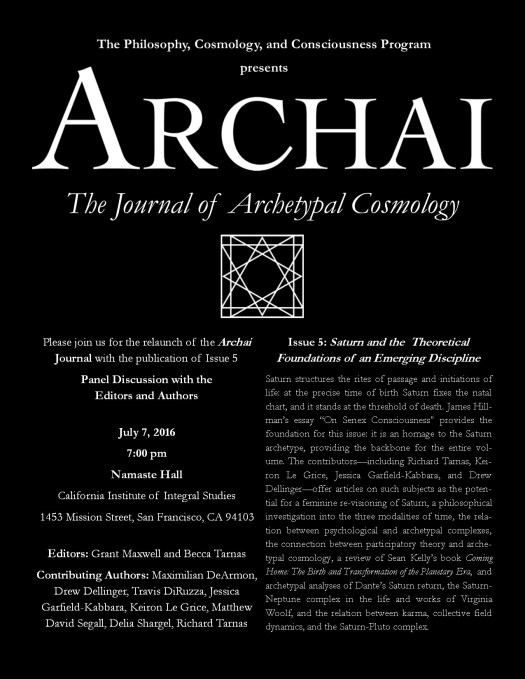It is with deep joy that I announce the publication of Issue 7 of Archai: The Journal of Archetypal Cosmology, titled Historical Roots and Current Flowerings. The issue is now available in paperback, and will soon be released as a Kindle ebook as well!
To read two preview articles written by Laura Michetti and Daniel Joseph Polikoff, please visit our page Current Issue page.
The seventh issue of the Archai journal has been long in the gestation process, and seemed to be awaiting the exact conjunction of Saturn and Pluto before coming to birth. The issue was completed during the New Moon in Aquarius, on January 24, 2020, just twelve days after Saturn and Pluto made their exact alignment in Capricorn. It has been an honor and a privilege to work with each author for this issue, and I am immensely proud of the result and so grateful for all that the authors have contributed.
The issue is dedicated to the late Gerry Goddard, in honor of his significant contributions to the intersections of archetypal cosmology and transpersonal psychology. We had the privilege of including in the volume one of his pieces of writing, titled “Toward an Astrological Model of Consciousness.”
 About the Issue:
About the Issue:
The historical roots of archetypal cosmology extend across the globe and deep into the reaches of time. This issue draws together several such lineages, while also turning toward further flowerings of archetypal cosmology in the contemporary world, such as the theoretical connections between astrological archetypes and psychological types. The contributing authors—including Laura Michetti, Petr Lisý, Daniel Polikoff, and Gerry Goddard—offer articles on such historical subjects as the Persian origins of the Saturn return, the importance of Prague in the development of transpersonal psychology and archetypal cosmology, and the Romantic and poetic lineages of those same disciplines. Richard Tarnas explores the role astrology can play in our current time of crisis. The issue closes with three book reviews on the subject of C. G. Jung’s relationship to astrology, and the significant collaborative role Toni Wolff held in the development of analytical psychology.
Table of Contents:
• Laura Michetti – “Persian Conjunctions and the Origins of the Saturn Return“
• Petr Lisý – “The Archetypal Tradition of Prague”
• Daniel Joseph Polikoff – “Rowing Back: The Romantic Origins of Transpersonal Psychology“
• Michael Kiyoshi Salvatore – “Astrology and Psychological Types”
• Richard Tarnas – “The Role of Astrology in a Civilization in Crisis”
• Gerry Goddard – “Toward an Astrological Model of Consciousness”
• Gustavo Beck – “C. G. Jung’s Textual Firmament: A Review of Safron Rossi’s and Keiron Le Grice’s Jung on Astrology”
• Safron Rossi – “A Review of Jung’s Studies in Astrology: Prophecy, Magic, and the Qualities of Time and The Astrological World of Jung’s Liber Novus: Daimons, Gods, and the Planetary Journey by Liz Greene”
• Becca Tarnas – “An Astrological Review of Toni Wolff & C. G. Jung: A Collaboration by Nan Savage Healy”
To order a copy of the issue, please visit: Historical Roots and Current Flowerings.




